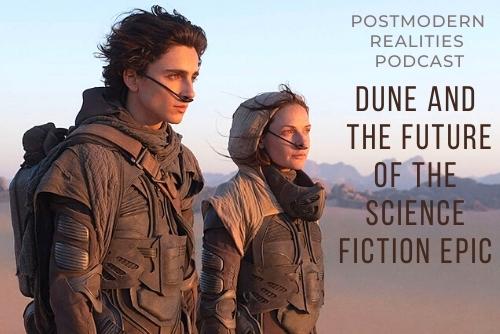For science fiction readers, the very mention of Frank Herbert’s 1965 novel Dune evokes a flurry of emotions. Some love it, some hate it. Some consider it the best science fiction novel ever written, others consider it the genre’s antithesis. Regardless, no history of science fiction worth its salt can go without at least mentioning the book, and the indelible influence it’s had on numerous genre classics that followed it, from Star Wars (1977) to Pitch Black (2000).
Denis Villeneuve’s 2021 film adaptation of Herbert’s novel plants its flag firmly in the ground of the epic science fiction genre. This is not the operatic adventure of Star Wars, though Luke Skywalker and Paul Atreides slot neatly into the same mythological archetype. Villeneuve’s Dune is much closer to Ronald D. Moore’s brilliant reimagining of the television series Battlestar Galactica (2004-2009) in terms of tone and accessibility. The result is an adaptation that sacrifices Herbert’s nuance and intricacies to remain faithful to the original novel in terms of size and scope and—most importantly—to the character arc of main character Paul Atreides (Timothée Chalamet), a messiah like figure who is the heir of the House Atreides, an aristocratic family that rules the ocean planet Caladan. The House of Atreides is sent by the Emperor to replace the House of Harkonnen and rule the desert planet Arrakis (Dune) where its people are subjugated and its valuable resource of the life-extending spice is mined.
The ideas Herbert plays with throughout the Dune series are obviously provocative. Villeneuve was keenly aware of the kind of controversy Dune would spark. In the months before the film was released, he made his intentions clear when pressed about the story’s “white savior” overtones. Herbert was not interested in merely critiquing the “white” savior motif. He was interested in critiquing the notion of a savior, period. There are books upon books to be written from a Christian perspective interacting with the ideas central to Dune. How should a Christian respond to Frank Herbert’s criticisms of savior narratives? We should approach Dune unsentimentally and with clear-eyed sanguinity. Christianity is most definitely a messianic religion, but in the two thousand years since Christ, his followers have made more than their fair share of mistakes—Herbert was right in this regard. When the savior’s work is taken up by mortals, things go awry. Dune looks less like a critique of the New Testament’s Jesus and more like an Old Testament messianic expectation. We witness Paul Atreides’s rise and fall much in the same way we read about Samson’s, or David’s. Herbert would likely contend that we should get comfortable here, enlighten ourselves, and accept that savior narratives point to the flaws of saviors themselves.
This Postmodern Realities episode is a spoiler-filled conversation with Journal author Cole Burgett about his online-exclusive, Dune and the Future of the Science Fiction Epic.
Please note this article will be fully accessible by the public in the future, to get early access to read it now, please see our FAQ section on Early Access to Online-Exclusive Articles by clicking here.
We’d also like to invite you to subscribe to the Journal. To subscribe to the Journal, please click here.
When you to subscribe to the Journal, you join the team of print subscribers whose paid subscriptions help provide the resources at equip.org that minister to people worldwide. These resources include our ever growing database of over 1,500 articles, as well as our free Postmodern Realities podcast.
Another way you can support our online articles is by leaving us a tip. A tip is just a small amount, like $3, $5, or $10 which is the cost for some of a latte, lunch out, or coffee drink. To leave a tip, click here
Other articles and Postmodern Realities podcasts featuring this author
Episode 259: All the Time in the World: No Time to Die and the End of an Era
All the Time in the World: No Time to Die and the End of an Era
Episode 251 Growing Up and Letting Go in CODA
Growing Up and Letting Go in CODA
Episode 242: Friendship and Fatherhood in Pixar’s Luca
Friendship and Fatherhood in Pixar’s Luca
Episode 239: No Us Without Him: The Life, Death, and Resurrection of Zack Snyder’s Justice League
No Us Without Him: The Life, Death, and Resurrection of Zack Snyder’s Justice League
Episode 234: Star Wars Happy and Glorious in The High Republic
Episode 227 Catharsis and the Power of Release in WandaVison
Catharsis and the Power of Release in Wandavison
Episode 222 Deconstructionism and the Gospel of Hope in Logan
Deconstructionism and the Gospel of Hope in Logan
Episode 218: Wonder Woman 1984: The Truth Is Enough.
Wonder Woman 1984: The Truth Is Enough.
Episode 214 Star Trek’s Christopher Pike: An Old Fashioned Hero For Our Cynical Times
Star Trek’s Christopher Pike: An Old- Fashioned Hero for Our Cynical Time
